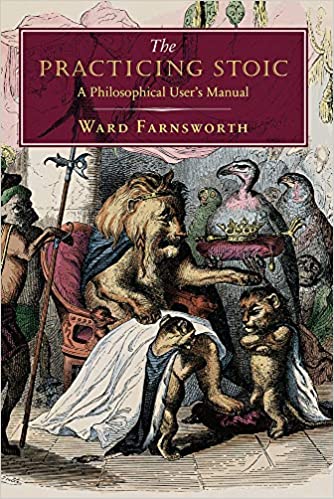Books |
The Practicing Stoic
By
Published: Jul 12, 2020
Category:
Philosophy
GUEST BUTLER CRAIG LAMBERT is the author of Shadow Work: The Unpaid, Unseen Jobs That Fill Your Day and Mind Over Water: Lessons on Life from the Art of Rowing. He was a longtime staff writer and editor at Harvard Magazine.
The ancients had self-help books. No classical Oprah interviewed writers on a divan in an amphitheater. Nor did authors clamber aboard a trireme to be rowed off on book tour. The Greeks and Romans called their self-help gurus “philosophers.” They taught and wrote in an era when philosophy actually aimed to help people live more satisfying lives.
In contrast, modern philosophy has become an academic discipline. Try reading a masterpiece like Ludwig Wittgenstein’s 1921 Tractatus Logico-Philosophicus. You may find some bracing intellectual stimulation, but it’s dubious how much of it, if any, you can apply to daily life. Furthermore, even Wittgenstein’s brilliance will probably not endure like the pragmatic philosophy of the Stoics, still relevant and resurgent now more than 2,000 years after its founding in about 300 B.C. by Zeno of Citium. Just possibly, Stoicism’s durability might reflect its value in making the choices we confront every day.
Credit some of the current Stoical renaissance to Ryan Holiday, who takes the school of thought so seriously that he has tattooed the titles of two of his bestselling Stoicism-influenced books, The Obstacle is the Way, and Ego is the Enemy, on his arms. His book, The Daily Stoic, offers 365 meditations on the philosophy, which his site, Daily Stoic, also celebrates.
Coincidentally, the coronavirus pandemic may be driving readers to seek sane and effective ways of dealing with suffering. The Stoics do have some practical tips. Marcus Aurelius (121-180 A.D.), the admired Roman emperor whose Meditations remains the most famous Stoic volume, reigned during the Antonine Plague (quite possibly smallpox), which raged from 165 to 180 A.D. and, at an appalling mortality rate of 25 percent, killed an estimated five million people. [To read the Head Butler review and/or buy the book of the “Meditations,” click here.]
Fortunately, there is now an elegant “crash course” in Stoicism available in a beautifully published volume. The Practicing Stoic: A Philosophical User’s Manual,” by Ward Farnsworth, dean of the law school at the University of Texas, arranges its exposition of Stoicism into 13 chapters organized around themes like desire, death, wealth and pleasure, emotion, and virtue. Farnsworth’s highly accessible format uses short quotations, typically about a paragraph long, from the preeminent Late (Roman Empire) Stoic writers, especially Seneca, Epictetus, and Marcus Aurelius. [To buy the book or Kindle of “The Practicing Stoic” from Amazon, click here.]
The author’s introductory and explanatory passages set up and elaborate on the words of the ancients. Thus, in the “death” chapter, we learn from Seneca that “Men do not care how nobly they live, but only how long, although it is within the reach of every man to live nobly, but within no man’s power to live long.” Farnsworth prefaces this by noting that “Virtue and honor are goods not measured in time; the person who has them has lived long enough.” Throughout the book, he also interlards passages from later writers like Montaigne, Adam Smith, Schopenhauer, and Samuel Johnson, which nicely establish the eternal relevance of the Stoics’ questions. It is rare for writings so ancient to feel not even faintly dated.
Modern usage equates “stoicism” with a kind of tough-minded indifference to pain or hardship. But this is misleading, something like calling D. H. Lawrence a writer who specializes in sex: yes, Lawrence deals frankly with sex, but there is so much more. The Practicing Stoic’s opening chapters are on judgment and externals, two cornerstones of the philosophy. To the Stoics, human life consists of both events and our opinions (judgments) about events. In general, they say, we react to our opinions rather than the events themselves. This offers real leverage, since we have fair authority over our judgments, but relatively little over events. “So when we are impeded or upset or aggrieved, let us never blame others, but ourselves—that is, our opinions,” declared Epictetus, who, as a former slave, had had ample opportunity to blame others. [To read the Head Butler review of Epictetus and/or book the book from Amazon, click here.]
The Stoics urged people to carefully place their attention on the things they can control, starting with their own viewpoints. Epictetus again: “There is only one road to happiness—let this rule be at hand morning, noon, and night: stay detached from things that are not up to you.” The corollary is to minimize the importance of “externals” like wealth, fame, power, or status. “Both death and life, honor and dishonor, pain and pleasure, wealth and poverty—all these things happen equally to good men and bad, being neither noble nor shameful,” wrote Marcus Aurelius. “Therefore they are neither good nor evil.”
After trimming away the irrelevancies and distractions, the Stoics find only a couple of ends worth striving for: reason and virtue. They advise us never to let the world’s dismaying incidents unseat human reason from its place of authority in the soul: keep your head about you, in other words. And at all times, try to cultivate virtue—moral, generous, kind, loving action in the world. Over the centuries, it’s a perspective that has served those who would listen admirably well. It has never been more applicable than in the lives we live today.


